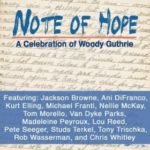
429 Records
There are two ties that bind the tunes found on Note Of Hope: A Celebration Of Woody Guthrie_. The first and most obvious is Woody himself, whose words (gathered from unpublished letters, poems, and journals) were the inspiration for the music.
The other is bassist Rob Wasserman, whose amazing tone and delivery is the common denominator of the album’s dozen cuts. Whether it’s the funky/sexy slippery slickery of “Union Love Juice” (yes, racy Woodyness rapped out by Michael Franti) or the saddle-slapping Spaghetti Western trot of “Ease My Revolutionary Mind” (delivered with dead-eye seriousness by Tom Morello); the work-shirted joy of Pete Seeger’s voice and Tony Trischka’s banjo on “There’s A Feeling In The Music” or the smoky sultriness of Madeleine Peyroux’s vocal on “Wild Card In The Hole”, Wasserman’s bass is right there. He swoops; he dives; he rumbles, slaps, ricochets off the drums, and carries the vocalists on his back – and sometimes he simply pauses and lets the rhythm breathe for itself. Truly, Note Of Hope contains some of the best studio-recorded bass performances released this year.
It was Guthrie’s daughter Nora who asked Wasserman to head up the Note Of Hope project, recruiting a wide assortment of voices and players to bring Woody’s written words to life. Wasserman shines in that role, as well: the guests on Note Of Hope were well chosen. For instance, on “The Debt I Owe”, Lou Reed was the perfect candidate to play the role of a man detached enough to tally up the debts of his soul with a slow shake of his head rather than a “woe-is-me” wail. Kurt Elling’s vocal “Peace Pin Boogie” (the tale of a man who, in turn, is sent packing from his sweetie’s door, the local tavern, Heaven, and Hell because he’s “got no peace pin on”) is delivered with the ideal mix of gospel-like power and twinkle-eyed humor. And Van Dyke Parks’ opening instrumental “A Note Of Hope” is the ideal mix of string-section glory and banjo/bass beans in a can over a campfire.
The album was obviously a while in the happening; guests Chris Whitley and Studs Terkel are no longer with us, having passed away in 2005 and 2008, respectively. Their performances are wonderful tributes to themselves as well as to Woody, however – Whitley applies his blues grease to “On The High Lonesome” and the spoken-word “I Heard A Man Talking” is putty in Terkel’s hands. Ani DiFranco does her own speak/sing thing on “Voice”, a lesson in hearing/listening/absorbing/realizing, while Nellie McKay delivers a soft, yet powerful rumination on aging in “Old Folks”.
Jackson Browne is featured in the almost-15-minute-long opus “You Know The Night”, built from a 30-page notebook entry of Woody’s describing the first time he met his wife Marjorie. The arrangement is simple and the instrumentation is sparse (guitar/bass/drums), allowing for Browne to testify Woody’s love at first sight totally open and uncluttered. Simply put, it’s one of the most heartfelt performances Browne’s laid down in a studio for decades – Woody poetry made from simple words and honest feelings, delivered with hobo jazz pureness and a naked heart. Wasserman’s bass is equally important as Browne’s vocal, supporting the words of love with a soft foundation that coaxes, caresses, and cuddles.
Note Of Hope is eclectic; it’s interesting; it’s beautiful. Would Woody Guthrie have approved? I believe he absolutely would have.



No Comments comments associated with this post